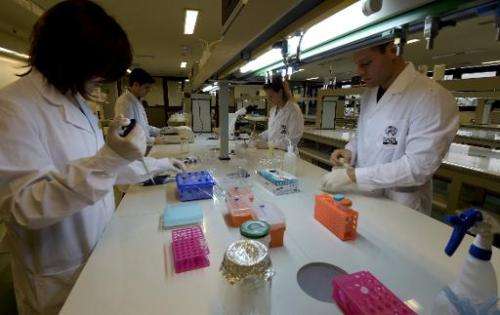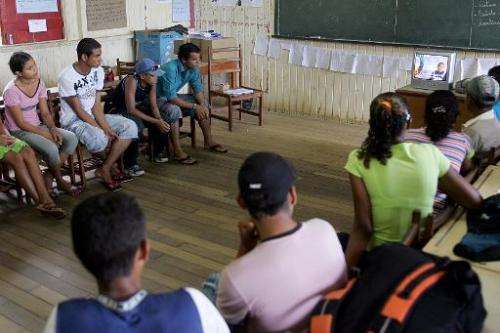Latin America universities fail to make grade

Nobel prize week can prompt uncomfortable soul-searching at universities in Latin America, which has produced relatively few winners in the sciences—a symptom, experts say, of the region's struggles in higher education.
Latin America's universities are often overcrowded, underfunded institutions where most professors do not have doctoral degrees and many students end up dropping out.
After increasing investment in higher education over the past two decades, the region has more than doubled enrollment and increased its production of scientific papers more than six-fold, to 4.3 percent of world output.
"But the bad news is that the quantity has not necessarily been accompanied by quality," said Jorge Balan, an Argentine sociologist and higher education specialist at Columbia University in New York.
"We have more scientists than in the past, more full-time university faculty, faculty which is better prepared, and their production has increased. But the quality of research is not as good in international terms."
Latin America's universities are largely absent from world rankings, and those that do make the cut come in far from the top.
In the most recent Times Higher Education rankings, no Latin American university made the top 200.
The best ranked, the University of Sao Paulo in Brazil, made the top 225 but came in behind institutions in other emerging markets like Russia, South Africa and Turkey.
And few Latin American researchers have gained international recognition at the highest levels.
Latin Americans have won the Nobel peace and literature prizes 14 times, but just seven times in the fields of physics, chemistry, medicine and economics—a drought that has continued at this year's Nobels, which wrap up Monday with the awarding of the Nobel Memorial Prize in Economic Sciences.
The brain drain also remains a problem for universities, with much of the best talent moving to Europe and the United States.
Across the region, fewer than one in 10 university professors has a PhD.

"In most of Latin America the academic profession is not a full-time profession. Most of these folks are part-timers who get paid very little and who have other jobs to be able to make a living," said Philip Altbach, director of the Center for International Higher Education at Boston College.
"You can't build a top-flight university on the basis of part-time faculty. That's kind of an iron law. You can't get around that."
'Darwinian' system
Students also face daunting obstacles to get their degrees.
In countries like Argentina and Mexico, tertiary education is built around public universities that aim to provide free or low-cost education to anyone who can meet basic requirements.
The University of Buenos Aires and National Autonomous University of Mexico are sprawling institutions with hundreds of thousands of students, most of whom never graduate—a system Altbach called "Darwinian."
Just 25 percent of admitted students graduate in Argentina. In Mexico, the figure is 30 percent.
High dropout rates mean resources devoted to higher education are being used inefficiently, said Liz Reisberg, an independent education consultant who has studied Latin America for 30 years.
"There's been massive investment in improving higher education, but the priority has been to focus on access—building more institutions, creating more access for more people," she said.
As the region fights to reverse deeply entrenched inequality, what it needs, she argued, is a diversified system with more private institutions, technical training and community colleges for students who may not want or need traditional university degrees.

That, and more research funding—particularly from the private sector.
First Fields Medal
There are bright spots, however.
In Sao Paulo state, the richest in Brazil, one percent of income taxes goes directly to a foundation that supports university research, funding world-class science programs.
Rio de Janeiro also has highly regarded institutions, including the National Institute for Pure and Applied Mathematics—one of whose researchers, 35-year-old Artur Avila, last month became the first Latin American to win the Fields Medal, the most prestigious prize in mathematics.

That is "a good sign" for Brazilian universities, said Marcelo Knobel, a professor at Campinas State University in Sao Paulo who has written extensively on higher education.
The problem now, he said, is making sure lower- and middle-class Brazilian children are getting better education in public primary and secondary schools.
"We don't have enough good students reaching university. They don't even know basic operations in mathematics. We can't produce more engineers because we don't have enough students," he said.
"We should really focus now on basic education."
© 2014 AFP

















